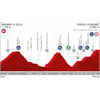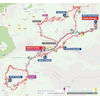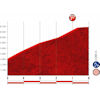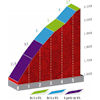It doesn’t take long for the Coll d’Ordino to appear. The 8.9 kilometres climb at 5% is emblematic for what the day holds up its sleeve. A long descent leads to the foot of the Coll de la Gallina, which is an irregular monster of 12.2 kilometres with an average gradient of 8.3%. The Gallina was the final ascent of the 2018 Vuelta, so Simon Yates sealed his overall victory on these slopes, while Enric Mas climbed to the stage win.
Following yet another long descent, the riders face a brutal finale with three consecutive ascents. The Puerto de Comella (4.2 kilometres at 8.6%) and Puerto de Engolasters (4.8 kilometres at 8.1%) are almost immediately followed by the Cortals d’Encamp, so it is fair to say the final haul up is a grinding task of 20 kilometres. There is hardly any distance between the respective climbs. To pep things up, 4 kilometres on dust road precedes the final climb on Cortals d’Encamp.
The first kilometre of the Cortals d’Encamp climb goes up at 11.9% and the second slopes at 9.5%. Then the stage eases out a bit, but the average gradient of the 5.7 kilometres climb still sits at 8.3%.
La Vuelta used the Cortals d’Encamp climb for the time as a finish in 2015. Mikel Landa took the win in a long-range solo move.
The first three riders on the line gain time bonuses of 10, 6 and 4 seconds, while the intermediate sprint (at kilometre 70.2) comes with 3, 2 and 1 seconds.
Another interesting read: results/race report 9th stage 2019 Vuelta a España.
Vuelta a España 2019 stage 9: route, profile, more
Click on the images to zoom
+ Click for more images (6)
Related articles Favourites stage 9: Short thriller in the Pyrenees - Vuelta 2019 The Route - Vuelta 2019 Riders - Vuelta 2019 Withdrawals - Vuelta 2019 Route and stages - Vuelta 2019 Favourites - Vuelta 2019 More articles Tour of Flanders 2025: The Route
Tour of Flanders 2025: Riders
Tour of Flanders 2025: Favourites
Tour of Flanders 2025 - women: The Route
Tour of Flanders 2025 - women: Riders
Tour of the Basque Country 2025: Route
Tour of the Basque Country 2025: Riders
Tour of the Basque Country 2024: GC Favourites
Tour of the Basque Country 2025 Route stage 1: Vitoria-Gasteiz - Vitoria-Gasteiz
Tour of the Basque Country 2025 Route stage 2: Pamplona - Lodosa
Tour of the Basque Country 2025 Route stage 3: Zarautz - Beasain
Tour of the Basque Country 2025 Route stage 4: Beasain - Markina-Xemein
Tour of the Basque Country 2025 Route stage 5: Urduña - Gernika-Lumo
Tour of the Basque Country 2025 Route stage 6: Eibar - Eibar
Paris - Roubaix 2025: The Route
Paris - Roubaix 2025: Riders
Paris - Roubaix Femmes 2025: Route
Paris - Roubaix Femmes 2025: Riders
Amstel Gold Race 2025: The Route
Tour de France 2025: The Route
Tour de France 2025 Route stage 1: Lille - Lille
Tour de France 2025 Route stage 12: Auch - Hautacam
Tour de France 2025 Route stage 14: Pau - Superbagnères
Tour de France 2025 Route stage 16: Montpellier - Mont Ventoux
Tour de France 2025 Route stage 18: Vif - Col de la Loze
Cycling Calendar 2025
Volta a Catalunya 2025: Sprint triumph Brennan, Ayuso reclaims GC lead
Giro 2025: The Route
Giro 2025 Route stage 1: Durazzo - Tirana









